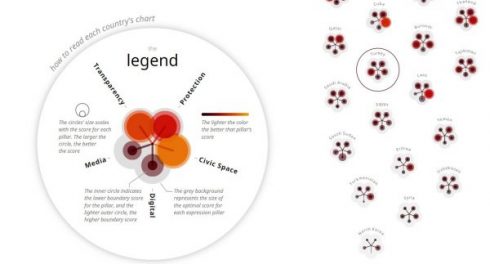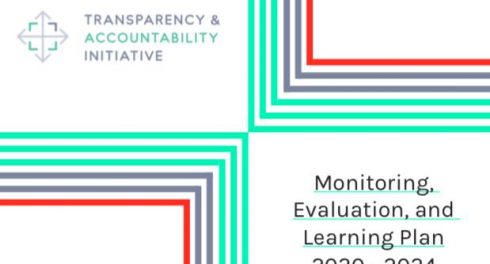Highlight:
- String theory
- Trading health for dystopia?
- Participation in the quarantined state
- Money corrupts – part two
- Sticker price shock
- Gender threats, all in a word and story tracing
- Organizational survival tips
- TAI Spotlight: Going virtual in the Coronavirus era
String theory

Image credit: Frontline Club
Around the world, governments are rushing to push through stimulus packages of unheard-of size. A logical response to the health emergency, but there are tensions around what strings to attach. Are governments irresponsible to release huge sums without any safeguards or oversight on how those funds will be spent? Lessons from the financial crisis in 2008 suggest yes (part of broader shifts to appreciate the value of corporate/finance sector accountability). How to ensure huge sums aren’t lost to corruption? Abigail Bellows gives recommendation on what we can do to repel corruption from exacerbating the pandemic while Lorena Rivero Del Paso argues it is time to take radical and extraordinary measures to ensure fiscal transparency.
Meanwhile, as covered in the last TAI Weekly, transparency is proving essential in winning public trust and motivating appropriate behaviors in response to COVID-19. The Open Government Partnership (OGP) is crowdsourcing a list of open government approaches being implemented to tackle the virus. Please submit examples you’ve seen and help them spread the word. Hopefully a good antidote to those actively spreading disinformation to undermine trust in governments. Want insights on how to frame issues in the context of the pandemic, Frameworks Institute are offering regular updates.
Intriguing that investment giant BlackRock is not letting the pandemic be an excuse to drop good broader corporate good practice. The firm has vowed to continue to challenge companies that fall short on governance – everything from excessive executive pay to poor environmental risk management.
Trading health for dystopia?
Yuval Noah Harari, Sapiens author, is already looking at the long term consequences and worried about the precedents we may enable amid the health crisis. He poses two choices – between totalitarian surveillance and citizen empowerment, and then between nationalist isolation and global solidarity. Jedidiah Bracy picks up on the challenge of balancing personal privacy and public interest. China’s example has shown the potential of surveillance to help curb spread of the disease but at what cost to personal freedoms? Barbari Li and Bohua Yao reflect on the Chinese experience about data protection. Cathy Cosgrove ponders implications for US and EU data protection laws.
Today’s crisis is bringing to the fore debates that have been bubbling. A new Knight Foundation report details a growing “techlash” as people worry that protections are being traded for profits. Petra Molnar takes experiences in regulation of migration to remind us that it isn’t the technologies that determine the outcomes, but the people behind them. A challenge amid the pandemic is whether we even know what data is being collected on us. Flavie Halais was asking that question even before this emergency and dives into the Sidewalk Labs experiment in Toronto to consider the implications, including their plan to test icons to indicate “digital transparency” when data is being collected in public spaces.
Of course, medical advances against the spread of COVID-19 are also being greatly aided by data sharing fostering collective intelligence (read up more on frameworks for collective intelligence). Payal Arora and Hallam Stevens offer insights on data governance across borders. Key to realizing the potential of data sharing in a responsible way is data stewards, who act as facilitators between fields. (In grad school and wondering what path offers more job security? Start plotting to become a data steward).
Participation in the quarantined state
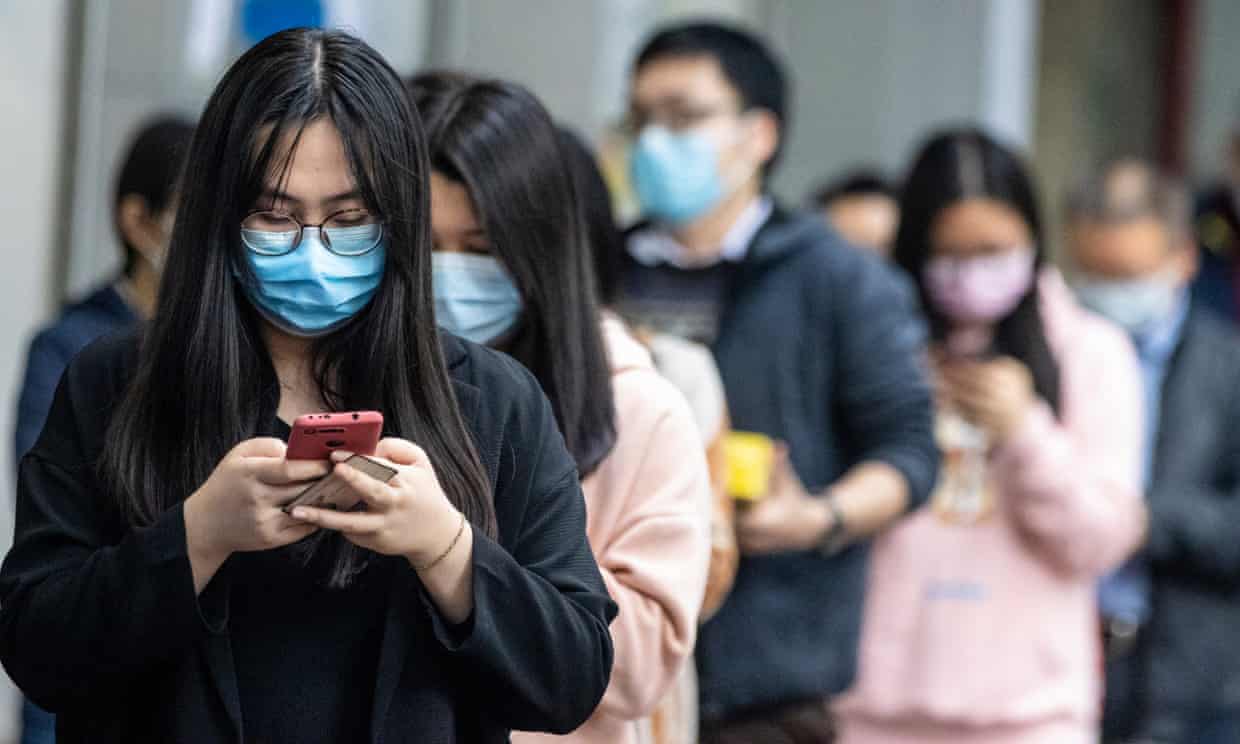
Photo Credit: Alex Plavevski/EPA
What of Harari’s desire for citizen empowerment through this crisis? A few encouraging signs. Mi You details how Chinese civil society self-mobilized in a way never seen before. Philippe Coullomb shares four lessons for establishing the best conditions for success for participative democracy initiatives, while Paul Maassen says it’s time for you to ask not what your politicians can do to build citizen trust in government, but what your government’s bureaucrats can do for you. So much more to be done than hoarding toilet paper.
A ray of hope cast by these UK-based groups working on improving civic participation as funder Nesta share their work with a cohort of social movements for health. A research also throws new light on the impact of civic interventions and civic education and response to information about democracy.
How to advocate on your issue in the current context? Beautiful Trouble’s Rae Abileah and Nadine Bloch offer some tips while Asian youth climate activists are already shifting tactics.
Money corrupts – part two
Returning to overseeing fiscal prudence. The tumble in oil prices means that oil producing countries have to rethink their finances, but for tiny Guyana and Suriname, new production will still be a gamechanger and there are worries about how to bolster public services and minimize cronyism. They could take lessons from other countries aided by a just-in-time synthesis funded by UK DFID on developing the public sphere with oil revenues. Transparency is a good starting point and Belgium explain why they are supporting the roll out of the Extractive Industries Transparency Initiative in fragile state contexts. Meanwhile, the EITI itself is urging the United States Securities and Exchange Commission to align rules with its own, holding to a higher standard than currently proposed. Amazing to think this rule is still being negotiated a decade after the financial crisis that prompted the legislation.
Meanwhile, in Australia, mining giant Fortescue Metals receives $3.8million from the federal government’s controversial Indigenous advancement strategy.
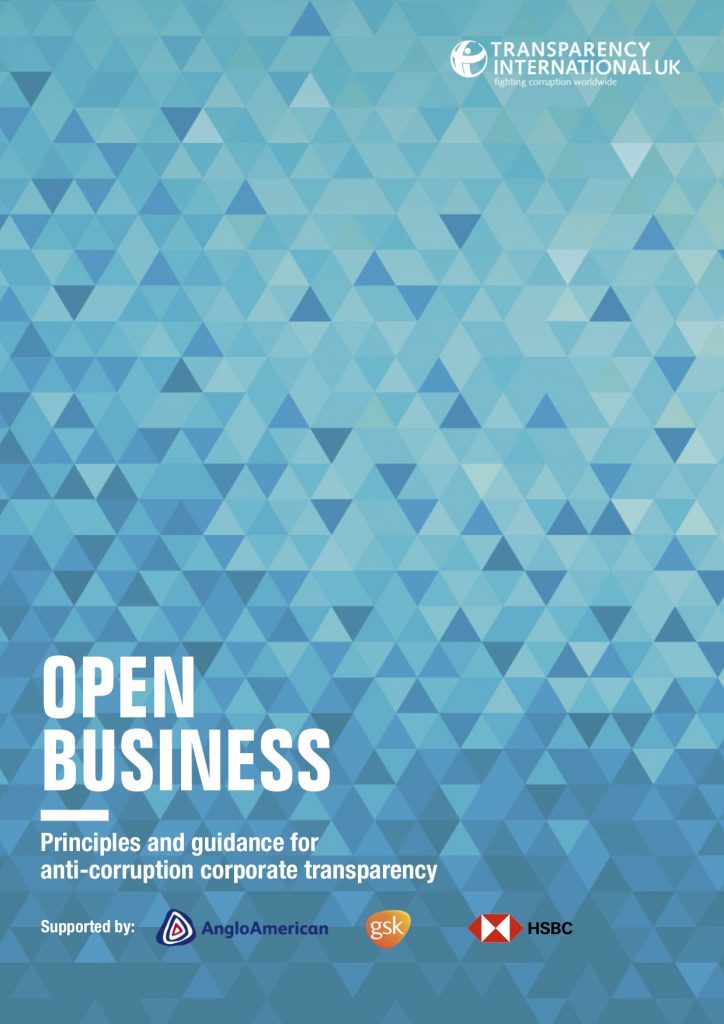
LONG READ: Open Business: Principle and guidance for anti-corruption corporate transparency
Transparency International UK’s Open Business report sets a new bar for disclosures in anti-corruption and governance and provides an aspirational but achievable roadmap to better corporate practice. The report is informed by extensive research including in-depth interviews with legal and compliance figures from FTSE 100 companies, insight from some of the world’s biggest institutional investors, and Transparency International’s own anti-corruption expertise.
Sticker price shock
Where do cronies stash their monies? Bricks and mortar are always tempting. Eye-watering figures in this analysis from Matthew Page on Nigerian political elites and their proxies with property in Dubai : 800 properties linked to 334 individuals worth $400 million – roughly two-thirds of the Nigerian Army’s annual budget and over three times the annual budget of the country’s Independent National Electoral Commission.
London is another popular destination and Nathan Brooker details the implications of new regulations to halt money laundering in the capital’s luxury property market and new responsibilities for estate agents. Just as we referenced calls for a reform of the audit profession last week, responsible behaviours of those in the property professions might be similarly strengthened.
Looking more society-wide, to tackle the “impunity problem”, members of the international anti-corruption community are thinking about reforms to international justice institutions.
The U.K. Parliament’s aid watchdog is also launching a wide-ranging investigation into the impact of U.K. aid and DFID. The investigation will cover five key areas, including accountability of government systems and structures, in line with the broader aims of the integrated review.
Gender threats, all in a word and story tracing
Web pioneer Sir Tim Berner-Lee also published an open letter warning that a growing crisis of online abuse and discrimination against women and girls is threatening global progress on gender equality. Good to check out this new handbook from Global Forum for Women Development on practical tools to address gender gap in the new media.
Good news that Jonathan Fox’s 2018 article, The Political Construction of Accountability Keywords, is now available in Spanish and Urdu, while Rajika Seth highlights Accountability India’s challenges and lessons from attempting to translate social accountability terminology into Hindi in a way that works for grassroots activists.
Kirsty McNeill offers ten recommendations to tell our stories more effectively to turn the tide when faced with a crisis of legitimacy. Talking of stories, take the time to track where your institutional stories flow. Check out our “Let’s follow where the story goes” visual for inspiration.
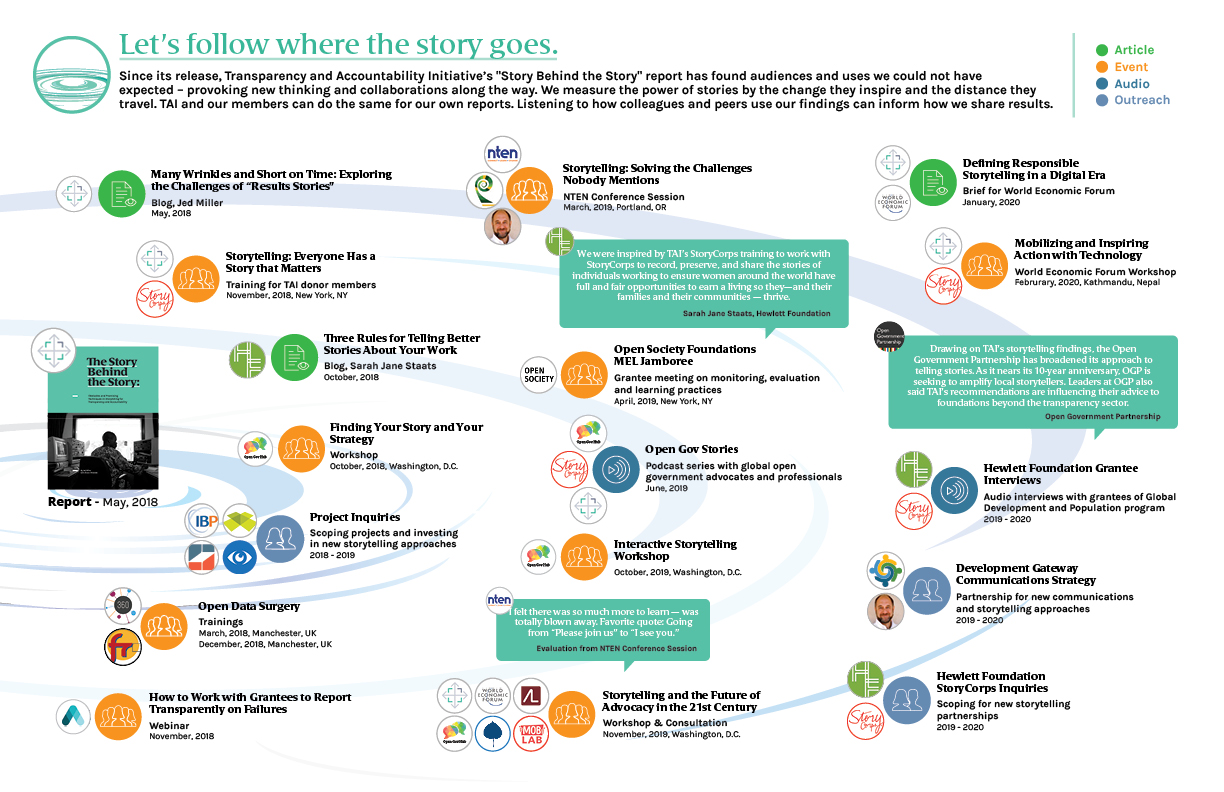
An infograph showing how our stories have travelled
Essential Listening: Justice aligned
In this month’s Taxcast from Tax Justice Network, hear the co-founder of Extinction Rebellion connect tax justice and climate justice. You will also get to hear the voices of British tax office workers from their protest outside the UK Parliament against the government’s closing of tax offices, shedding up to 50,000 jobs. Unfortunately this is a worldwide trend.
Organizational survival tips
We end, no surprise, back on the pandemic, but this time how governance non-profits can survive the turmoil. Wondering what other groups are doing or what you can do in response to COVID-19? Here are some resources to help you save time, stay up-to-date , and keep you focused on your most pressing priorities. Dave Algoso is among those urging flexibility — shifting goals and practice . We have also published a resource sheet to help you plan your virtual meetings efficiently.
Donors are trying to help, including TAI members (see more under TAI Spotlight). For example, Ford Foundation and Hewlett Foundation joined a group of foundations to give more autonomy to grantees to help them remain financially viable and concentrate on the services they provide. Laura MacDonald advice nonprofits to learn from past crises like 9/11 and the Great Recession to stay connected with donors right now. Her recommendation? “Don’t stop talking to big donors just because the world is being shaken. Past experience shows some donors never forgive the charities that don’t reach out in times of need.”

TAI Spotlight: Going virtual in the Coronavirus era
Going Virtual in the coronavirus era| Transparency and Accountability Initiative
Like many organizations around the world, we will be working remotely for the foreseeable future. To stay connected with your team and others during this pandemic, checkout this resource to chose the best platform for your virtual meetings and how to run effective virtual meetings.
A call to action: Philanthropy’s commitment during COVID-19 | Ford Foundation
The Foundation joins 40 other organizations, including the William and Flora Hewlett Foundation, to create a philanthropy pledge that will provide our nonprofit partners flexible funding support during the COVID-19 global crisis. Join the pledge here.
COVID-19: Our commitment to grantee partners | MacArthur Foundation
The Foundation reinstates its commitment and support to helping its grantees all over the world find ways to carry out their missions at this challenging time of the coronavirus outbreak.
COVID-19: Supporting our partners | Luminate
As new advice and information becomes available, Luminate will review its responses to COVID-19 and will provide updates on any material changes. In the meantime, the organization will continue to provide immediate support to its grantees through their funding lead or primary contact.
CALL
- Job postings at Ford Foundation – Ongoing
Job postings at Luminate – Ongoing
BetterTogether Challenge for innovators – Ongoing
Job postings at Democracy fund – Ongoing - Free Digital Security Training – Ongoing
- Open Road Alliance Charitable Grant and Loan to organizations responding directly to COVID-19 – Ongoing
- Diversity Maynard 200 Journalism Fellowship – March 30, 2020
- One World Media Fellowship – April 2, 2020
- Indela, Digital rights in Latin America (call for proposal) — April 4, 2020
- Call for proposals – Swashakt: Empowering women through collectives and group-based approaches – April 14, 2020
Call for Applications: WE EMpower UN SDG Challenge 2020 – April 15, 2020 - Global Tech Challenge: Solutions for Women – April 15, 2020
- Centre for Investigative Journalism Conference Grant – April 19, 2020
- Call for Applications: Making a Difference Awards (highlights and promotes how the best of research has made a significant difference to Charities and Not-For-Profits) – April 27, 2020
- Co-Impact systems change grants (round three) – April 30, 2020
Request for proposal: Independent Public Interest Journalism – April 30, 2020
Call for suggestions on Humanitarian and Development Data Forum agenda – May 2020 - Grants fund investigative journalism – May 4, 2020
- Call for Projects Paris Peace Forum 2020 – May 12, 2020
- Call for applications: Intensive Anti-Corruption Training for Future Leaders – May 20, 2020
- Proposal Submission for the 2020 Summer Evaluation Institute – June 7-10, 2020
Amartya Sen Essay Contest 2020: Illicit financial flows – August 31, 2020
Call for Submissions to SSIR Series: Social Change in an Era of Extreme Polarization – Last Thursday of every month until early 2021
CALENDAR
Please double check the websites for these events to make sure they are still happening – most likely they are not, though some may now be reconfigured for virtual participation.
The Impacts of Civic Tech Conference (TICTeC) – March 24 – 25, 2020 (Online) You can also join TAI-relevant side event: Civic tech, tax, and trust event on March 24 at 1-2.15PM ET
The Nonprofit Technology Conference presented by NTEN – March 24-26, 2020 (Baltimore, United States of America)
Testing the frontier of collective intelligence – March 25, 2020 (London, United Kingdom)
Register for the 2020 OECD Global Anti-Corruption & Integrity Forum – March 25-26, 2020 (Paris, France)
Nonprofit Webinar: Coronavirus and Nonprofit Grants: Tactics and Strategies to Help You Adapt – CharityHowTo – March 27, 2020, 1:00 PM ET (Online)
EGAP Learning Days workshop – March 30-April 3, 2020 (Addis Ababa, Ethiopia)
[Webinar] Evidence into Policy and Practice Seminars: Research uptake and impact – how do funders see its future? – March 31, 2020
Devex Development Career Forum (exhibitor registration closes 17 March) – March 31, 2020 (Washington, D.C., US)
Second Meeting of the Tendler Network – April 3, 2020 (MIT, Cambridge, United States of America)
Harambee – Let’s All Pull Together (largest gathering of Black professional in philanthropy) – April 16-18, 2020 (Raleigh, North Carolina, United States of America)
Global Technology Governance Summit – April 21-22, 2020 (San Francisco, United States of America)
Shaping the Future Forum 2020 – April 22 – 23, 2020 (Washington, DC)
British Expertise International Awards 2020 – April 23, 2020 (Kensington, United Kingdom)
3ie London Evidence Week Conference 2020 – April 23, 2020 (London, UK)
Personal Democracy Forum CEE 2020 – April 23-25, 2020 (Gdansk, Poland)
2020 International Symposium on Online Journalism (ISOJ) – April 24-25, 2020 (Austin, United States of America)
Frontiers of Social Innovation: People, Power & Resources: The Redistribution Wave – May 12-14, 2020 (Stanford University, California, USA)
2020 Media Impact Forum (funder-only gathering) – June 2, 2020 (New York, United States of America)
Transparency International: 19th International Anti-Corruption Conference – June 2 – 5, 2020 (Seoul, South Korea)
Human Rights Litigation Summer School at Berlin, Germany – June 8-12, 2020
Women and Girls Africa Summit – June 9-12, 2020 (Durban, South Africa)
RightsCon 2020 – June 9-12, 2020 (San Jose, Costa Rica)
2020 Neighborhood Funders Group National Convening (philanthropy support to grassroots power-building) – June 29 – July 1, 2020 (Washington, DC)
WE EMpower UN SDG Challenge 2020 – September 18 – 27, 2020 (New York City, United States of America)
The 2020 Journalism Funders Gathering (funder-only gathering) – October 6-7, 2020 (Philadelphia, United States of America)
Humanitarian and Development Data Forum – November 2-4, 2020 (Chambery, France)
International Open Data Conference –November 18-20, 2020 (Nairobi, Kenya)

